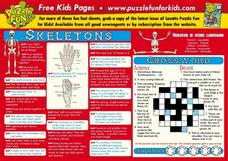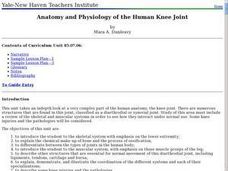Curated OER
The Human Skeleton
In this skeletal system activity, students label a diagram with the names of 12 bones in the human body. Students label the human skeleton in this online interactive activity by dragging the names of the bones to their appropriate boxes.
Curated OER
Skeletons
In this science worksheet, learners investigate the human skeletal system. Students read factual paragraphs with details about the bones in the human body and in some other species as well. Learners complete a crossword puzzle.
BioEd Online
The Skeleton
Don't be chicken to try a lesson plan that compares the anatomy of birds to humans. Read the background information so you don't have to wing it when it comes to the anatomy of a chicken. Prepare cooked chicken bones by soaking them in a...
Alabama Learning Exchange
Heads, Shoulders, Knees, and Toes
The identification of various parts of the human body is the focus of this biology lesson. Young scientists sing the song "Head, Shoulders, Knees, and Toes," and trace the human body onto butcher paper. Additionally, they label the parts...
Curated OER
Human Body Quest
In this biology worksheet, students describe and name their organ system selected and its major functions. Then they create a diagram of their body system with the major parts and organs labeled. Students also write facts about their...
Curated OER
The Human Body- Skeletal System
Sixth graders record a video. In this skeletal system lesson, 6th graders review what they already know about the skeletal system and then watch a presentation. Students work in groups to discuss what they learned and write a script for...
Curated OER
Preschool Lesson Ideas: Human Body Lesson Plan and Five Senses Activities
Students explore their five senses. In this human biology lesson, students participate in various learning centers that include activities such as creating a Q-tip skeleton, feeling play dough, creating "goop" and listening to drum beats.
Curated OER
Bones: Reading and Quiz
Make no bones about it- this anatomy worksheet is all about the human skeleton! Learners read a 2-page informational excerpt on bones and then use the information they learned to answer 9 recall questions, including 4 multiple-choice and...
Curated OER
Anatomy and Physiology of the Human Knee Joint
Students examine human anatomy with a focus on the knee joint. In groups, they research the chemical makeup of human bones and explain the different types of joints found in the body. To end the lesson, they identify the other structures...
Curated OER
Bite on This!
Different types of teeth have different roles. Third graders study how molars, incisors, and canines function in a rabbit skull and a cat skull. After answering some questions about the teeth of herbivores and carnivores, kids...
Curated OER
Skeletal System
Seventh graders identify and label twenty-five bones of the skeletal system. In small groups they glue various types of dried pasta to a large human body outline. They attach the pasta to the outline and label the pasta bones.
Curated OER
Dancing Skeleton Puppets
Students experience, explore and study the Mexican holiday Day of the Dead. They assess the importance of having bones, identify the different bones that we have in our body and encounter how to make a skeleton and decorate it in...
Curated OER
Skeleton
Students study the skeleton. In this human body lesson, students draw and label bones in the body by tracing each other and creating a skeleton out of body parts and brass fastners.
CK-12 Foundation
Skeletal System Joints: Appendages
The hundreds of joints in the human body fit into five main categories. A quick video explains the joints in the skeleton, which are often the most confusing. The interactive reviews each of the five types of joints and has scholars...
Curated OER
Comparing Human and Avian Skeletons
In this human and avian skeleton review worksheet, students read about both skeletal systems and respond to 10 fill in the blank and drawing questions.
Curated OER
Dem Dry Bones Take Form
Students discover human anatomy by dancing with a song in class. In this human body lesson, students listen to the song "Dem Dry Bones" and identify the different parts of a paper human skeleton. Students perform a dance that goes...
Curated OER
Moving and Growing: The Human Body
In this human body worksheet, students identify the body parts on the skeleton: shoulder blade, skull, arm, backbone, wrist, hand bone, knee cap, upper leg bones, lower leg bones, and foot.
Curated OER
The Skeletal System
Learners research the skeletal system. In this anatomy lesson, students measure their bodies to find the approximate length of their bones. They draw and cut out each of the bones and then attach them using brads or glue.
Curated OER
Life Science: Human Body Skit
Students create skits based on the human body systems. Working in groups, they role-play as organs in the various systems. They make costumes or wear signs identifying themselves as the organs in their skits.
Curated OER
The Bones of the Body
Third graders recognize the bones that make up the human body. They become more aware of the human body. Students experiment with this concept with a variety of items. They also work on this concept with dribbling a ball.
Curated OER
The Human Skeletal System: Inside and Out
Students study bone size, structure and shape. They use various geometrical shapes to make a skeleton and produce a poster depicting the skeletal system and its functions. They arrange the pictures into the five sections, glue on...
Curated OER
DISARTICULATED SKELETON
In this anatomy worksheet, 8th graders cut out the different parts of the skeleton and then put them back together and label it with the help of the example.
Curated OER
From Human Skeletons to Owl Pellets to Paleontology
Students explore about the function of the skeleton and comprehend the names of the bones of the human skeleton. They compare bones of the human skeleton to a dinosaur skeleton and graph to compare these bones. Students sort bones to...
Curated OER
EXPLORING OUR HUMAN BODIES
Students observe and investigate the human skeletal and muscle systems. They become aware of the versatility of movement as well as gain experience through the use of diagrams and hands on activities. An extensive vocabulary is covered...

























